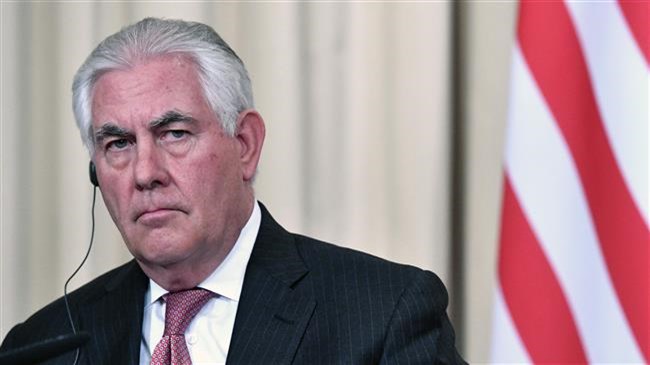Trying to justify tougher action against Iran, the Trump Administration has issued a double-edged message, saying that Tehran is
complying with the 2015 nuclear deal but that the Islamic Republic is the “world’s leading state sponsor of terrorism”.
Secretary of State Rex Tillerson (pictured) delivered the message in a Wednesday press conference after giving the Adminstration’s response to Congress about the progress of the nucleare agreement.
Secretary Tillerson: Today I’d like to address #Iran’s alarming and ongoing provocations that export terror and violence. pic.twitter.com/Q7RLVkMwWQ
— Department of State (@StateDept) April 19, 2017
Tillerson had grudgingly written, in a letter to Speaker of the House Paul Ryan, that Iran is adhering to the restrictions on its nuclear program. This appeared to preclude a US abandonment of the deal based on the pretext of Tehran’s non-compliance.
However, almost all of his press conference was devoted to claims of “alarming and ongoing provocations that export terror and violence, destabilizing more than one country at a time”, justifying the continuation — and probably attempt to expand — of some US sanctions.
Tillerson gave no indication of specific measures beyond saying that the Administration is carrying out a “comprehensive review of our Iran policy”.
Questioned about the status of the deal, Tillerson struggled between the rhetoric of a US challenge and the official line of continued adherence. He said that the Joint Comprehensive Plan of Action “completely ignored all of the other serious threats that Iran poses” and that it does not “achieve the objective” because it is “buying off a power who has nuclear ambitions; we buy them off for a short period of time and then someone has to deal with it later”.
But pressed, “Should we break out of [the deal]?”, Tillerson stepped back, “We just don’t see that that’s a prudent way to be dealing with Iran, certainly not in the context of all of their other disruptive activities.”
A Regional Confrontation
The Secretary of State began by framing a regional confrontation beyond the nuclear issue, with Iran “undermining U.S. interests in countries such as Syria, Yemen, Iraq, and Lebanon, and continuing to support attacks against Israel”. But Tillerson then made an allusion which brought back the spectre of nuclear weapons: “An unchecked Iran has the potential to travel the same path as North Korea, and take the world along with it.”
He spoke of Iran’s ongoing tests of medium-range ballistic missiles, claiming they violate a UN resolution passed at the time of the nuclear deal, and turned Tehran’s announcement of a forthcoming launch of a vehicle into space as a move towards an “operational intercontinental ballistic missile”.
Tillerson also cited Iran for “one of the world’s worst human rights records”, where “political opponents are regularly jailed or executed, reaching the agonizing low point of executing juveniles and individuals whose punishment is not proportionate to their crime”. He mentioned the detention of dual nationals, including US citizens.
US Defense Secretary Meets Saudi Leaders
Tillerson’s message came as US Defense Secretary James Mattis met the leaders of Saudi Arabia, Iran’s rival in the region, in Riyadh
After discussions with King Salman and his son Mohammed bin Salman, the Deputy Crown Prince and Defense Minister, which “could not have gone better”, Mattis praised the Saudis and slammed Tehran:
What was really obvious to me today was the regional leadership role of the Saudis, and how they’re helping across the region.
It’s very clear that Saudi Arabia is stepping up to its regional leadership role … at a key time in terms of trying to restore stability in this key region in the world….Everywhere you look, if there’s trouble in the region, you find Iran….The nations in the region and others elsewhere are trying to checkmate Iran and the amount of disruption, the amount of instability they can cause.
While calling for negotiations over the Yemeni civil war, in which Saudi-led intervention has killed thousands of civilians, Mattis put the blame on Iran. He said Tehran was providing weapons to the Ansar Allah (Houthi) movement, which controls the capital Sana’a and much of the country:
We will make progress on this, the international community will make progress on it. We will have to overcome Iran’s efforts to destabilize yet another country and create another militia in their image of Lebanese Hezbollah.

